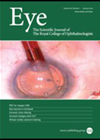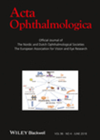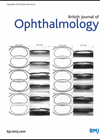You searched for "laser treatment"
Avastin vs. Volon A for diabetic macular oedema
1 June 2014
| Nana Theodorou
|
EYE - Vitreo-Retinal
This prospective randomised interventional clinical trial compared 30 diabetic patients with macular oedema treated with either intravitreal injections of bevacizumab (Avastin) or triamcinolone (Volon A). One group initially received three injections of 2.5 mg Avastin in monthly intervals whilst the...
Management of diffuse OSSN with topical chemotherapy
Ocular surface squamous neoplasia (OSSN) can be localised to the conjunctiva or, less commonly, diffusely spread over the conjunctiva and cornea. Localised OSSN can be treated by surgical removal with adjuvant cryotherapy and chemotherapy with low rates of recurrence. Diffuse...Does Ozurdex affect perfusion status in vein occlusion?
1 October 2018
| Eulee Seow
|
EYE - Cataract, EYE - Refractive
|
intravitreal dexamethasone implant, peripheral nonperfusion, retinal vein occlusion, wide-field fluorescein angiography
Ozurdex (intravitreal dexamethasone implant) has been approved by National Institute of Health & Care Excellence (NICE) for treatment of patients with macular oedema associated with vein occlusion. This study looks at the change in peripheral perfusion status in patients with...
Improved efficacy expected with second-generation microinvasive glaucoma surgery (MIGS) devices
1 July 2015
| Rod McNeil
|
EYE - Glaucoma
Microinvasive surgical approaches to primary open-angle glaucoma (POAG) offer minimally traumatic options for effective intraocular pressure (IOP) reduction in appropriately selected glaucoma patients. Increases in laser trabeculoplasty rates and wider adoption of glaucoma drainage device filtration procedures, together with the...
Injection frequency and anatomic outcomes following conversion to Aflibercept in neovascular AMD patients
1 December 2014
| Jonathan Chan
|
EYE - Vitreo-Retinal
This is a retrospective study of patients with neovascular age-related macular degeneration (AMD) treated with intravitreal Lucentis and / or Avastin who were switched to aflibercept (Eylea). This study was carried out by the Casey Eye Institute retinal clinics, between...
Intravitreal aflibercept for retinal angiomatous proliferation (RAP)
2 December 2019
| Sofia Rokerya
|
EYE - Vitreo-Retinal
In this prospective study the authors present the visual and anatomical outcome of patients with RAP lesions who were treated with intravitreal aflibercept. The study cohort of 46 patients reached study completion at week 96. They were all Caucasians, with...
Management of proliferative diabetic retinopathy
1 August 2014
| Felicity Allen, Samantha S Mann
|
EYE - Vitreo-Retinal
Diabetic retinopathy is a major cause of blindness in the working-age population. Due to the worsening global epidemic of diabetes, the incidence of morbidity caused by the disease is set to increase [1]. The prevalence of diabetes in the UK...
Hot debates in medical retina and imaging: Perspectives from the Controversies in Ophthalmology 2020 virtual conference
Controversies in medical retina and imaging were debated during the Controversies in Ophthalmology 2020 virtual conference held during two mid-day scientific sessions on 27 and 28 March 2020. The author recounts key perspectives and presents viewpoint recommendations from the Vision...The role of inflammation in the pathophysiology of DMO
1 February 2016
| Fiona Harris, Spyridon Chalkiadakis, Simon Taylor (Prof)
|
EYE - Vitreo-Retinal
Diabetic macular oedema (DMO) is a major cause of visual loss in diabetes, with a complex multifactorial pathogenesis. In the UK alone it is estimated that there are nearly 2.5 million diabetic patients aged over 12 years. Approximately 65,000 of...
A patient report of pseudoxanthoma elasticum, angioid streaks and choroidal neovascularisation
1 October 2015
| Zaria Ali, Mohammed Alarbi, Salwa Abugreen
|
EYE - Cataract, EYE - Cornea, EYE - General, EYE - Glaucoma, EYE - Imaging, EYE - Neuro-ophthalmology, EYE - Oculoplastic, EYE - Oncology, EYE - Orbit, EYE - Paediatrics, EYE - Pathology, EYE - Refractive, EYE - Strabismus, EYE - Vitreo-Retinal
Angioid streaks (AS) on their own do not cause many problems, with the majority of patients remaining asymptomatic [1]. However, once choroidal neovascularisation (CNV) occurs, the visual prognosis of the patient rapidly declines [2]. Treatment is imperative to try and...
Initiatives in macular service provision
1 December 2015
| Rod McNeil
|
EYE - Vitreo-Retinal
A report from Monitor in October 2015 identifies good practices that will realise most of the potential productivity gain in elective care available to NHS hospitals. These include: stratifying patients by risk and creating low-complexity pathways for lower-risk patients (tailoring...








